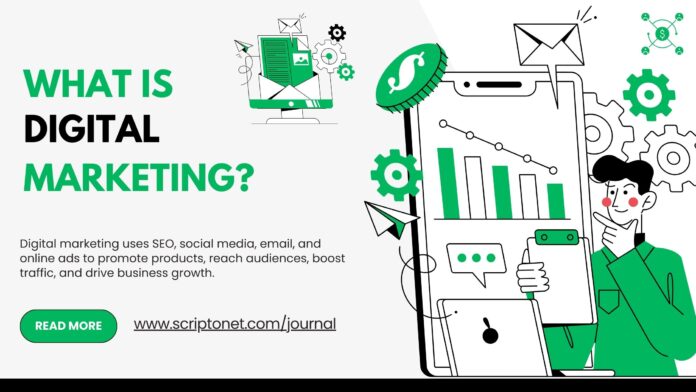Introduction
Digital Marketing represents the strategic use of internet-based platforms & technologies to connect with & engage potential customers. To answer the question of what is Digital Marketing, it encompasses a wide array of tactics, from optimizing search engine visibility & running targeted advertising campaigns to crafting compelling content & fostering relationships through social media & email. This approach allows businesses to reach a global audience, precisely target specific demographics & meticulously track the effectiveness of their marketing efforts.
The shift towards Digital Marketing is driven by the increasing prevalence of online activity & the wealth of data it provides. Businesses leverage this data to understand consumer behavior, personalize marketing messages & build lasting customer relationships. Unlike traditional marketing, digital strategies offer measurable results, greater cost-effectiveness & the ability to adapt in real-time to changing market conditions & consumer preferences, making it an essential component of modern business growth & success.
Core concept of what is Digital Marketing
Digital Marketing, in its essence, is the strategic deployment of various online tools & platforms to cultivate & maintain relationships with both existing & prospective customers. It’s a comprehensive approach that transcends mere advertising, encompassing a wide spectrum of interactive strategies designed to engage audiences within the digital sphere. This field necessitates a deep understanding of the online landscape, including search engine algorithms, social media dynamics & the evolving behaviors of internet users.
Essentially, Digital Marketing is about creating connections in the digital age, where interactions are often mediated through screens & algorithms. It involves crafting compelling content that resonates with target audiences, optimizing websites to enhance visibility in search engine results & utilizing social media platforms to foster community & brand loyalty. Furthermore, it encompasses the strategic use of email marketing to nurture leads & maintain consistent communication, as well as the implementation of paid advertising campaigns to reach specific demographics & drive targeted traffic.
The ability to meticulously track & analyze the performance of these various initiatives is paramount, allowing for continual refinement & optimization to maximize return on investment & achieve desired business outcomes. This data-driven approach is what distinguishes Digital Marketing from traditional methods, enabling businesses to make informed decisions & adapt to the ever-changing digital landscape.
Key components of Digital Marketing
The key components of Digital Marketing form a comprehensive toolkit for businesses seeking to establish a strong online presence & engage with their target audience. These components work synergistically to drive traffic, generate leads & ultimately, increase sales. Below are some components:
Search Engine Optimization (SEO) & Search Engine Marketing (SEM): SEO focuses on organically improving website visibility in search engine results, while SEM utilizes paid advertising to achieve prominent placement. Both are crucial for driving targeted traffic from search engines.
Social Media Marketing: This involves leveraging various Social Media Platforms (such as Facebook, Instagram & LinkedIn) to build brand awareness, engage with customers & drive traffic to websites or landing pages. It encompasses content creation, community management & paid social advertising.
Content Marketing: Creating & distributing valuable, relevant & consistent content to attract & retain a clearly defined audience. This can include blog posts, videos, infographics & other forms of digital content.
Email Marketing: Utilizing email to nurture leads, build customer relationships & promote products or services. It involves creating targeted email campaigns, segmenting audiences & tracking campaign performance.
Pay-Per-Click (PPC) Advertising: A scheme in which marketers are charged a fee each time one of their advertisements is clicked. This allows for highly targeted advertising across various platforms, including search engines & social media.
Affiliate Marketing: Partnering with individuals or businesses who promote your products or services in exchange for a commission. This can be a cost-effective way to expand reach & drive sales.
Mobile Marketing: Reaching customers on their mobile devices through various channels, including mobile-optimized websites, apps & SMS messaging.
Analytics & Data: The foundation of effective Digital Marketing, involving the collection & analysis of data to track campaign performance, understand customer behavior & optimize strategies.
Importance of Digital Marketing
The importance of Digital Marketing stems from its ability to provide businesses with unprecedented reach & engagement in a digitally driven world. Some are:
Broadened Market Reach & Global Connectivity: Digital Marketing eliminates geographical barriers, allowing businesses to connect with a worldwide audience, expanding market potential & fostering a global presence.
Precise Audience Targeting & Personalized Engagement: Digital platforms enable highly targeted campaigns, reaching specific demographics & interests, ensuring marketing efforts are efficient & relevant, maximizing ROI.
Data-Driven Insights & Measurable Campaign Performance: Digital Marketing provides detailed analytics, allowing for real-time tracking & optimization, enabling businesses to make informed decisions & refine strategies.
Cost-Effective Strategies & Resource Optimization: Compared to traditional methods, Digital Marketing offers flexible budgeting & targeted campaigns, minimizing wasted resources & maximizing efficiency.
Enhanced Customer Interaction & Relationship Development: Digital channels facilitate direct communication, fostering customer loyalty & building strong relationships through personalized experiences & responsive engagement.
Increased Brand Visibility & Online Presence: A robust digital strategy strengthens brand awareness & credibility, improving visibility in search engines & social media, establishing a strong online footprint.
Agile Adaptation & Real-Time Responsiveness: The dynamic digital landscape demands flexibility & Digital Marketing allows businesses to quickly adapt to trends & customer needs, responding promptly to market changes.
Competitive Advantage & Market Leadership: In a digital-centric market, businesses that effectively utilize Digital Marketing gain a significant competitive edge, establishing themselves as industry leaders & innovators.
Conclusion
In conclusion, Digital Marketing has become an indispensable part of modern business strategy, offering unparalleled opportunities for growth & connection. It empowers businesses to transcend traditional marketing limitations, reaching a global audience with precision & efficiency. By leveraging the power of data & analytics, marketers can optimize their campaigns in real-time, ensuring maximum return on investment & fostering meaningful customer relationships.
The dynamic nature of the digital landscape necessitates continuous adaptation & innovation, making Digital Marketing a constantly evolving field. Businesses that embrace its potential, integrating its key components into their overall strategy, will be well-positioned to thrive in the competitive online environment, building lasting brand loyalty & driving sustainable growth.
Frequently Asked Questions (FAQ)
What are the key differences between SEO & SEM?
Search Engine Optimization (SEO) focuses on organically improving a website’s ranking in search results, while Search Engine Marketing (SEM) involves paid advertising to achieve higher visibility. Both aim to drive traffic from search engines, but SEO is long-term & organic, whereas SEM is immediate & paid.
How can I assess whether my digital marketing strategies are working?
Success can be measured using various metrics, including website traffic, conversion rates, social media engagement & Return on Investment (ROI). Social media analytics platforms and Google Analytics are two examples of tools that offer useful data for monitoring campaign performance.
Which social media sites are most suited for business marketing?
The platforms that work best for you rely on your industry and target demographic. Platforms like Facebook & Instagram are widely used for general brand awareness & engagement, while LinkedIn is ideal for B2B marketing & professional networking & TikTok is very effective for reaching younger demographics.
Is content marketing still relevant & how do I create effective content?
Yes, content marketing remains highly relevant. Effective content is valuable, relevant & consistent. It should address your audience’s needs & interests, provide solutions & establish your brand as an authority. Creating a content calendar & utilizing various formats like blog posts, videos & infographics is essential.
What are the best practices and how significant is email marketing in a digital strategy?
Email marketing is highly important for nurturing leads & building customer relationships. Best practices include segmenting your audience, personalizing emails, providing valuable content, using clear calls to action & ensuring mobile optimization.


